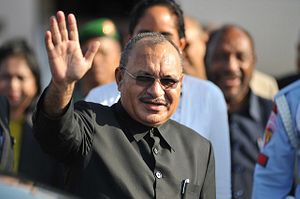The recent election in Papua New Guinea (PNG) continued the country’s tradition of chaotic campaigns. With violence breaking out both during the electoral campaign and after the results had been confirmed, an attempted kidnapping of a candidate, problems with the electoral roll, an overly sensitive Electoral Commissioner, and significant concerns over human rights abuses leading up to the polls.
After the results were established, and Parliament reconvened, Prime Minister Peter O’Neill was able to be returned to the head of the country’s government for a second five-year term. However, the nature of PNG society, and the influence of this election on its politics has him once again leading an unstable coalition of disparate political actors.
Traditionally political power within Melanesian societies was held by the “Big Man.” The Big Man is not a hereditary position, but one earned through a power of persuasion, empathy, and an ability to secure resources and distribute them fairly within the tribe or Wantok (“one talk” or language group, of which there are over 800 with Tok Pisin acting as the national lingua franca).
The Big Man’s position is constantly challenged by other men who seek to gather resources and prove themselves more capable than the current Big Man. This traditional culture has transmitted itself onto the country’s modern-day politics, where allegiance to the Wantok is deemed more valuable than any wider national vision.
One of the consequences of this has been that despite adopting a Westminster-style parliamentary democracy, a consolidation of interest groups into a small number of broad-based political parties has not developed. Party politics in the country remains very loose, and therefore PNG is perpetually governed by a series of unstable coalitions. Governments experience frequent votes of no confidence, and MPs will often abandon their own party to join another if it serves the interests of their Wantok (or their stature within it).
No party has ever won a majority of the 111 seats, and this fractured vote has remained with this election. The newly elected parliament contains 21 parties, with a further 14 independents (with 4 seats yet to be declared). Prime Minister Peter O’Neil’s People’s National Congress Party was only able to secure 27 seats. That the coalition he has been able to cobbled together includes all 14 of the elected independents would indicate the O’Neil will need to employ some sophisticated political tactics to keep his new government afloat.
The other major consequence of PNG’s traditional Big Man culture, and one with more far reaching consequences, is that it is extremely difficult for women to get elected to public office. Since independence in 1975, only seven women have been elected to Parliament.
The parliamentary gender disparity was reinforced by the recent election: for the first time in 25 years no woman was able secure a seat, despite more female candidates running for office than ever before (167 of the total 3,332).
This has pushed PNG back into being one of only five countries (along with Yemen, Qatar, Micronesia, Vanuatu) that do not have any female representatives in their national legislatures. The global average for female representation in national legislatures is currently at 23 percent.
Unfortunately, there are a number of hurdles that women face in getting elected in PNG. There remains a perspective within the country that women are lacking the requisite capabilities to become political leaders. Due to this attitude, it is difficult for women to broker enough support among various tribal leaderships who control voting blocs to obtain a sufficient base. That women have been kept out of traditional hierarchies means that they also lack the resources to buy votes within PNG culture of political patronage.
The 1979 United Nations Conventions of the Elimination of All Forms of Discrimination Against Women (CEDAW) had the equal participation of women in public life a key pillar of its concerns. Although PNG ratified the convention, it has not made any substantial progress towards achieving this goal.
In 2011 a bill was created to introduce 22 reserved seats for women in the national parliament (one for each province and the National Capital District). This was designed to fulfill the United Nations’ Millennium Development Goals (MDG) commitments of the PNG government by 2015. However, the electoral changes necessary required a constitutional amendment in order to be implemented, and this was unable to achieved.
The merits of quotas for political representation remain a subject of contention. It is also debatable whether the expectations within CEDAW constitute an imposition of Western norms onto PNG society, where the tribal structures have evolved and consolidated for over 40,000 years.
However, the evidence of the vast developmental benefits for communities, and countries as a whole, that an empowered female populace can bring should lead to a greater encouragement of female participation in public representation. Universal considerations such as high rates of violence against women, limited employment opportunities, and poor access to health care, should be deemed unacceptable in PNG society. Unfortunately, breaking down these norms will take time, but with no female representation in the country’s parliament the task becomes more difficult.

































